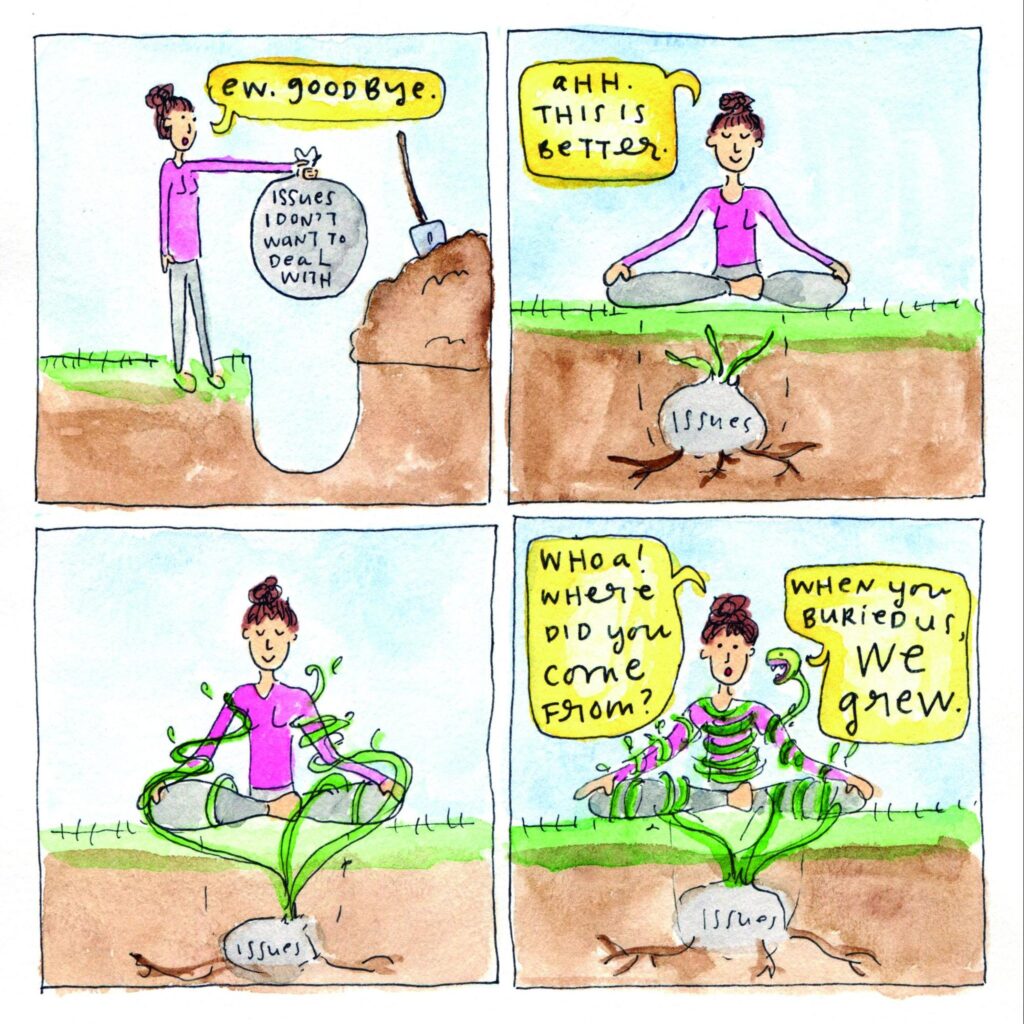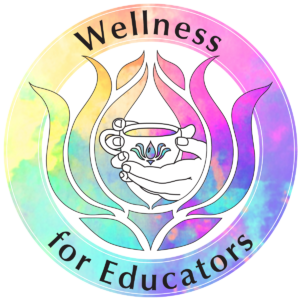
We are proud to present this guest blog post by Dr. Kathryn Kennedy, Founder and Executive Director of Wellness for Educators, sharing her story and making a call to action for supporting educator wellness.
Born in 2018, Wellness for Educators grew out of my experiences with early childhood trauma and my learning journey to understand those experiences. This learning journey led me to the mind-body and somatic education and practices that have been instrumental in not only my healing process but also in building the foundation of the organization. When it first began, Wellness for Educators was only going to have a small digital library of short, mind-body and somatic wellness videos for educators to incorporate into their busy schedules. However, in 2018 and 2019, I continued to hear about educator burnout and prolonged stress in my projects, which led our team to add more and more offerings and even invite a group of advisors to serve as a sounding board for our expansion ideas.
Digital Learning and Prolonged Stress
As 2019 drew to a close, we were contemplating shifting the organization from an assumed name under my education consulting firm to a 501(c)(3), but we just didn’t have the capacity to do it. Fast forward to March 2020, and COVID-19 hit. My knowledge and expertise in digital and online learning created an avalanche of work for my education consulting firm. I was guiding states, schools, districts, nonprofit organizations, and companies into online learning. In the midst of the chaos of that time, I was deeply concerned for the well-being of the education system and the world at large.
As you know, the majority of the education system was in complete and utter disarray—and for good reason. Educators were shifting to unknown teaching and learning practices. School leaders were shifting to lead in remote and online learning environments and supporting their communities in making that shift as well. Parents/caregivers took on additional responsibilities in supporting learning. Students were engaging in learning environments they weren’t prepared for. All stakeholders, especially educators and parents/caregivers, were wearing more hats than they should have been. They were being asked to provide mental health and wellbeing and social and emotional learning supports to their students and families, as well as serve as technology assistance when they themselves were barely trained or prepared for any of it. In addition, they were also trying to take care of themselves and their communities in the middle of a global pandemic. The field of education went into overdrive with no room for any of its stakeholders to take care of themselves.
Watching the pressure put on educators, students, and parents/caregivers was extremely overwhelming, saddening, and frustrating. There was so much instability with the constant shift in and out of schools as they experienced outbreaks and temporary quarantines. The field started focusing on learning loss and learning gaps, causing feelings of shame for educators, parents/caregivers, and students who were doing their best in the middle of an absolutely wild time in our history.
With all of these changes, there was ungroundedness and oftentimes a lack of safety and meaningful connection—two of the most important foundational pieces tied to cultivating nurturing learning environments.
In the middle of my consulting projects in 2020, I was emphasizing the need for supports related to mental health and wellbeing, not only for students but also for educators and parents/caregivers. Some clients said yes while others felt it was overkill and unnecessary. Some clients included supports only for social emotional learning (SEL). SEL is often used interchangeably with mental health and wellbeing. SEL is an important part of the overarching topic of mental health and wellbeing. I felt like it wasn’t enough, though. The world was experiencing too much prolonged stress and trauma, and I had a feeling that we were heading for a mental health crisis. This is when I made the decision to shift Wellness for Educators to a 501(c)(3) nonprofit.
Recognizing Trauma
In 2022, two years after the start of the pandemic, I finally started to hear acknowledgement that what was experienced by educators, students, and parents/caregivers was trauma and prolonged stress. I had one educator in just the last month share the following during one of our sessions:
I just realized how numb I have become to trauma.
As Peter Levine, author of Waking the Tiger: Healing Trauma, shares:
Trauma is perhaps the most avoided, ignored, belittled, denied, misunderstood, and untreated cause of human suffering . . . . Trauma has become so commonplace that most people don’t even recognize its presence. It affects everyone. Each of us has had a traumatic experience at some point in our lives, regardless of whether it left us with an obvious case of post-traumatic stress . . . . Because trauma symptoms can remain hidden for years after a triggering event, some of us who have been traumatized are not yet symptomatic…In our culture there is a lack of tolerance for the emotional vulnerability that traumatized people experience. Little time is allotted for the working through of emotional events. We are routinely pressured into adjusting too quickly in the aftermath of an overwhelming situation. Denial is so common in our culture that it has become a cliché.
One of my favorite artists is Tori Press of @revelatori. One of her pieces shared here illustrates what Dr. Levine shared about trauma remaining hidden and then resurfacing later in life when we don’t take the time to heal it.

As studies of Adverse Childhood Experiences (ACEs) have noted, we hold our stress not only in our minds but also within our bodies, so it’s even more important to take the time to heal for our physical health as well. Taking the time to heal from trauma and prolonged stress is vitally important for our learning process also because when we are in an unregulated state, no new learning can take place. The Polyvagal Theory by Stephen W. Porges explains more.
System-level Approach to Educator Wellness
Our work emphasizes that educator wellness is not an individual effort; it is a system-level effort. Dr. Albert Wong, a somatic psychotherapist and one of my teachers, said, “Challenges within communities or systems need interventions at the level of communities or systems.”
In this way, we have to look at factors within the school system that are contributing to educator wellness. Additionally, we look at our model as needing to support not just educators, but also students and their families, because every person in a school system contributes to educator wellbeing. The model that we use, System-wide Wellness Implementation Model (SWIM) is based on three research-, trauma-, and equity-informed models. (Learn more here, here, and here.) Informed by somatic psychology, this model intentionally aligns mind-body connection education and practices for every stakeholder, including leaders, educators, students, and families/caregivers and supports systems to cultivate safe, culturally-responsive, community-centric, humanity-driven learning spaces.
My initial motivation to learn more about my experiences with trauma and prolonged stress centered on my fear of not knowing what was happening to me when I was struggling. I also looked at continuing to learn as a way to take my power back, which is often taken from us when we experience trauma and prolonged stress. As I learned more and as my self-compassion and experiences grew, that fear eventually shifted into empowerment, insatiable curiosity, unrelenting motivation, and intrigued interest in gaining more knowledge. That fervor for learning formed the foundation of our work at Wellness for Educators, which thrives at the intersection of mental health, trauma, prolonged stress, healing, and its effect on our ability to teach, lead, learn, and support.
Mental health and wellbeing is at the center of our model and led us to contracting with licensed mental health professionals, including licensed clinical social workers, licensed master social workers, psychologists, therapists, and counselors, as well as educators in the field who were prioritizing mental health and wellbeing in their work. Our team also expanded to include certified somatic professionals who support mind-body healing modalities, including but not limited to yoga, meditation, qigong, art, music, and dance. The foundation of what we do at Wellness for Educators is to provide mind-body connection training, education, and practices to heal prolonged stress and trauma. By taking this system-level approach, we can affect real change for educator wellbeing and the wellbeing of all stakeholders within learning communities.
Charter Moms Chats
Watch Kathryn Kennedy, Ph.D., speak about supporting educator wellness with Inga Cotton on Charter Moms Chats on March 21, 2023 at 4:00 PM Central live on Facebook and YouTube.

With one foot in digital and online learning and the other in mental health and wellness, Dr. Kathryn Kennedy has been cultivating her two primary passions for over 15 years. On the digital and online learning side, Kathryn serves as founder and principal consultant of Consult4Ed Group. On the mental health and wellness side, Kathryn combined her work in education and wellness to create Wellness for Educators, a 501(c)(3) nonprofit invested in and passionate about creating system-wide wellbeing and mental health and wellness supports for educators. To learn more about her story, check out her upcoming book The Mind-Body Connection for Educators: Intentional Movement for Wellness, which serves as the first book in a four-book series.

Wellness for Educators is a 501(c)(3) nonprofit supporting educators with research-based, trauma- and equity-informed, somatic (mind-body) education, practices, and strategies for mental, physical, social, and emotional health and wellbeing. The organization provides a whole-system approach, bolstering schools, districts, and community-focused organizations to cultivate safety, connection, belonging, and resilience for all stakeholders, including educators, students, and family/caregivers.
Read More About Educator Wellness
- Peter Levine, Waking the Tiger: Healing Trauma, 1997
- Tori Press, @revalatori
- Stephen W. Porges, The Polyvagal Theory: Neurophysiological Foundations of Emotions, Attachment, Communication, and Self-regulation, 2011
- Carine Viac and Pablo Fraser, “Teachers’ Well-being: A Framework for Data Collection and Analysis,” OECD, January 27, 2019
- “Indicators of Schoolwide SEL,” CASEL
- “Whole School, Whole Community, Whole Child (WSCC),” CDC
- “Kathryn Kennedy,” Educator Wellness Roundtable, October 31, 2019
- “Together We Can Save Childhood,” Jennifer McCarville, San Antonio Charter Moms, January 25, 2023
- “International Play Association Conference in San Antonio Promotes Children’s Right to Play,” Amanda McMickle and Tessa Baden, San Antonio Charter Moms, September 7, 2022
- “Parenting Kids with Anxiety Disorders,” Abby Hasberry, San Antonio Charter Moms, September 14, 2022
- “Family Self-Care Plan,” Erica Martinez, San Antonio Charter Moms, March 19, 2021
- “Mindful Parenting: Practicing Peacefulness in Your Home,” Deborah Haddock, San Antonio Charter Moms, September 2, 2020
- “Mindfulness Moments with Yoga for Classrooms,” Paula Turner, San Antonio Charter Moms, July 20, 2020
- “The New Digital Parenting: Connections Over Conflict,” Emily Daniels and Lindsay Durham, San Antonio Charter Moms, July 9, 2020
- “Embracing Emotional Learning During a Pandemic,” Kristen Henry, San Antonio Charter Moms, June 14, 2020
- “No, Really, How Do You Feel? Helping Children and Teens Understand and Regulate Their Emotions,” Kristen Henry, San Antonio Charter Moms, June 3, 2020
- “Self Care While Staying at Home,” Lora Idol, San Antonio Charter Moms, April 6, 2020
